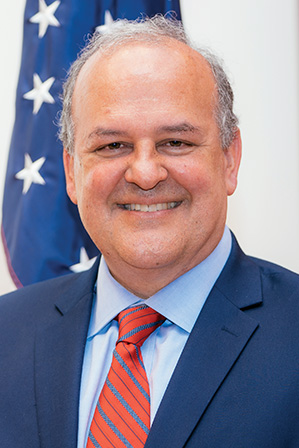2024: Celebration, Reflection—and Looking Forward
President’s Views
BY TOM YAZDGERDI

It is not every year we celebrate the 100th anniversary of both the modern Foreign Service and the creation of AFSA as a professional association. There is much to celebrate. With the passage of the Rogers Act of 1924, the basic foundations of a diplomatic career were laid, many of which still exist to this day.
This includes the establishment of a highly competitive entry process, promotion by merit, provision of benefits and allowances, and a rudimentary retirement system. Thus began the building of an organization with an esprit de corps that has marked U.S. Foreign Service members as a distinct cadre within the federal government.
It is a proud legacy, but there is also much to reflect and build on. In the wake of the Rogers Act, the Foreign Service was almost entirely male and white. The lone Black diplomat on staff, Clifton R. Wharton, was nearly denied entry and was made to suffer innumerable inequities from the beginning of his career in 1925. As for women, it would take decades before they could serve as equal members of the Foreign Service.
AFSA has planned a number of events throughout 2024 to remember and reflect on our profession. We have assembled an honorary centennial committee, whose members include former U.S. presidents and Secretaries of State—a truly impressive group. Their participation speaks volumes about the esteem in which they hold the Service.
Looking to the future, we will use this milestone in our history to press for greater recognition of what we do and for changes to ensure the health of the U.S. Foreign Service for future generations of Americans.
First, I believe we can use this opportunity to help change the narrative about what the Foreign Service is all about and how vital it is to the well-being of our country.
Yes, we have largely gotten away from the stereotype, if it ever really existed, of an effete service living the high life abroad. But there still isn’t real public appreciation of the call to duty and the sacrifice that our profession entails.
With its deployments, merit promotion, up-or-out system, and rank-in-person, the U.S. Foreign Service is more akin to the military than it is to other agencies of the government.
We can also help get the word out by expanding support for the Hometown Diplomats program and the Pearson Fellowships on Capitol Hill, for creating more assignments to state and local administrations, and for promoting greater outreach to the media, the Congress, and the public.
We have a great story to tell and a proud milestone as a backdrop, but we need the resources and reach to tell it.
All of this means that we need an international affairs budget that recognizes and supports the unique nature of the Foreign Service. AFSA recently completed a cost-of-living survey that details how difficult it is for Foreign Service members to afford a Washington, D.C., assignment, especially for entry- and mid-level employees.
Most of us spend two-thirds of our careers living and working at overseas posts, many of which are in difficult and dangerous places away from our families and friends. We have to uproot ourselves every two or three years and often have only one income, as spousal employment—while better now than in the past—is still a huge challenge. In short, we need greater resources to effectively do our jobs.
None of this will be easy, especially in an election year. The call to reduce discretionary government spending will no doubt be an issue in the upcoming electoral debates.
That is why it is critical for AFSA and others to make the case for appropriate funding for the Foreign Service. Despite the difficulties, I believe there is a bipartisan core of support in Congress if we make the strongest case possible.
All the best in the new year, and please let us know what you think by emailing yazdgerdi@afsa.org or member@afsa.org.
When sharing or linking to FSJ articles online, which we welcome and encourage, please be sure to cite the magazine (The Foreign Service Journal) and the month and year of publication. Please check the permissions page for further details.

